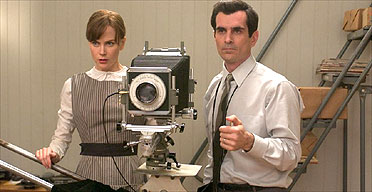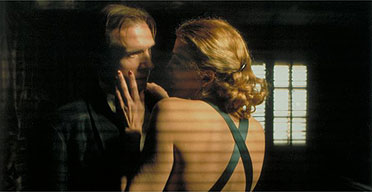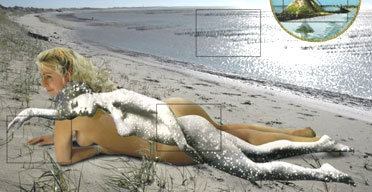There's a mole on the left side of Charlize Theron's neck that you could call her identifying mark. Somehow, this helps you get a fix on her. As an actor, she is often so physically consumed by whatever role she is playing - be it put-upon mine worker in North Country, lesbian serial-killer in Monster, beehived Britt Ekland in The Life and Death of Peter Sellers; ambitious southern wife in The Devil's Advocate - that if it weren't for this marker you could lose her completely. She's a shape-shifter.
A recent metamorphosis took her towards producing, with spectacular success, on Monster, the film that won her the 2004 Oscar for best actress. She took no small risk on the movie; the entire previous output of its writer and director, Patty Jenkins, consisted of a single short that Theron was begged not to watch. "There was nothing she'd done to convince me she was a good director," says Theron. "I just had a feeling. But I have been wrong before. Very wrong. I've been in situations when I've said to myself, 'Can I have rope please? Or some blades?'"
Now she has turned to documentary, producing East of Havana (directed by Jauretsi Saizabitoria and Emilia Menocal), which last week saw its British premiere at the Edinburgh international film festival. Charting the experiences of talented young hip-hop artists Soandry, Mikki Flow and Magyori, it is part document of a musical movement, and part meditation on loss and exile, with some of its most affecting material relating to Soandry's elder brother, Vladimir, who escaped Cuba a decade ago for the US.
The film determinedly declines to romanticise life in Castro's Cuba, pushing home again and again that these artists work in a climate of censorship and in conditions of dire poverty, denied human rights such as the freedom to travel. And it goes beyond that: there is already controversy brewing about its pro-American politics. Bizarrely, there is no mention of the US
blockade; responsibility for the worsening conditions in Cuba during the "special period" of the 1990s is laid firmly at Castro's door.
Theron's own view is that "the foundation of Cuba is censorship. You have to ask: would I take the free healthcare and education and accept being a prisoner in my soul?" The kids in the documentary are immensely articulate and literate, and spend a lot of time scribbling lyrics in their notebooks; it is ironic that their education has given them the means but not the opportunity to express dissent. "It's like having a key without a lock," she says.
Theron's ease with the political stance of the film perhaps stems from the fact that, like the subjects of the documentary, she was brought up without the luxury of democracy, albeit in a state of a drastically different complexion than Cuba's. She was born in the former mining town of Benoni, just outside Johannesburg in South Africa, and settled in the US in her late teens, when she was training as a ballerina while modelling to pay the bills (the latter she calls "my waitressing job"). The freedoms of the US, she argues, are of immeasurable value, and in danger of being taken for granted. "In countries where things are going well, people tend to forget the things that are really, truly important. It was interesting screening this film in America. Everybody grasps on to Cuba, but as soon as the conversation comes round to America and you see how this material reflects on the US, it's quite devastating. People are very scared to say anything that might come across as unpatriotic. But if you really, truly love a country - and I love living in America and I have a freedom that I never had in South Africa - then you should worry about those things."
As it happens, East of Havana is co-directed by two women, as were her most interesting acting roles, in Monster and North Country. The former is the story of a real-life prostitute, Aileen Wuornos, who started to kill after she was attacked and raped by a client; the latter is a dramatisation of a case in which a mine worker took on the appalling inequality and chauvinism of her workplace. Is there a feminist agenda underlying these choices? "No-o. I guess it's just part of my fibre," says Theron, who is draped at the head of a conference-room table that she says makes her feel as if she's in The Hudsucker Proxy. "I don't have an agenda. I just happen to have been fortunate enough to have been introduced to incredible women, and in the past three or four years I have creatively had my wings spread by very talented women. And my company is run by women. But I don't have any kind of agenda except to be truthful to whatever story I am telling. I had a responsibility as a woman not to betray [real] women like Aileen Wuornos in Monster or Josey Aimes in North Country."
She has, she says, a role model in her mother - who notoriously shot her father dead in self-defence during a violent attack - and believes that it's pointless to "wallow" in worries and self-doubt about negotiating Hollywood as a woman. "I was raised by strong women. My mother ran a construction company and I used to see her sitting with 30 men having a meeting, talking about rollers and building roads, and holding her own." Of the sexual tensions and manipulations of the casting couch, she says: "You have to know who you are. You walk into a room and let out an energy that says, 'There's a chance,' or an energy that says, 'No way.' I wouldn't let anyone walk over me just because I have breasts."
Theron shouldn't really be in films at all - her dream was to be a ballerina, which is what she'd been training for from the time she was a tiny girl. But, at 19 an injury ended her hopes, while she was living in New York, taking classes with the Joffrey Ballet School. Does she wish she had had a proper career in dance? Before the question is even out of my mouth she flashes back: "Yes. I loved it. I loved it. Loved, loved, loved it. It was my life."
It was not easy dealing with the realisation that a pair of busted knees had killed the dream. "You don't expect to have to retire at 19," she says. "My mom said, 'If you want to sulk about this, then you may as well do it at home - or you could look at this.'" At least through acting, Theron thought, she would be able to extrapolate what she valued most about ballet - storytelling. "Once I lost ballet, I had to step back and evaluate it in order to find something to replace it. At least I could do without eight hours of training every day, and blood poison from blisters on my toes not being able to heal and all of these things. But that moment when the curtain goes up and the music starts to play ... it's magical." Acting in ballet is underrated; great ballerinas tend to be great actors, I suggest. "I used to always say that ballet was my theatre, and a lot of people got offended by that, but I don't know why," she says.
Her route into Hollywood was a classic one - one-way ticket to LA; dispiriting times auditioning; wiping away her accent (she is a native Afrikaans speaker who learned most of her English when she moved to the US; in any case a South African accent was not welcome in castings); begging and pleading with a clerk to cash an out- of-state cheque when she was on her uppers; being spotted by a manager who was behind her in the bank queue. She did a lot of plain old plugging away. She lobbied writer/director James Gray hard for her role opposite Mark Wahlberg and Joaquin Phoenix in The Yards ("I got him drunk; that's when my manipulation really works well"), and he stuck out for her despite pressure from Miramax to give the role to "a name". She screen-tested six times for her part in The Devil's Advocate, opposite Keanu Reeves and Al Pacino, trying to convince them that she could be more than a leggy blonde. They thought she was too beautiful.
"Up until Monster, there were a whole lot of roles I just didn't get listed for," she says. The part of Wuornos, which Jenkins wrote with Theron specifically in mind, was "the first time someone came banging on my door". Jenkins's conviction that Theron was the woman for the role came when she was working on the script one night, with the sound down on the TV. She dropped off and awoke in the small hours; on the screen was one of the later scenes in The Devil's Advocate, where Theron's character, a perky southern belle, has now lapsed into such a state of derangement that she believes her ovaries have been stolen by dark forces. It's silly stuff, but given an immensely bleak and classy performance by Theron.
Theron's production company ended up making the film "because when financing came round no one else wanted to do it". In fact, being a producer on the film kept her sane. "If I hadn't had another job on that movie I would have killed myself - it was such a dark role." She liked hanging out and chatting to the crew, being part of the team; the busy-ness of having something to take her away from the nightmarish psyche of Wuornos.
What Theron has got in her acting, the great gift of her ballet training, is an ability to transform herself physically for every role she undertakes - something that goes way beyond the gaining of weight or the application of makeup or the endlessly, tediously noted "uglification" required for Monster. In a way, she dances her parts, choreographing herself such that she disappears bodily into them. That means - anathema to most actors - that she's not all that hung up on the script. "Words - and I really learned this when I played Aileen Wuornos - are just one element," she says. "Some of the stuff that that woman muttered out of her mouth made no sense at all, and then you saw her and you knew exactly what she was saying.
"The physical element in film is something that's often missing. We focus on a line, or dialogue. Honestly, it doesn't matter what you say at the end of the day as long as you are true physically and that you have an understanding of the world that you're in and the person you are playing."
Given that Theron's background is the stage, it is surprising that she hasn't done theatre, but she may yet. She'd love to work at the Gate in Dublin, it's just a question of finding something that she could devote three months to and "do twice a day with real enjoyment". Plus, she says, with one of her occasional colloquial lapses that reminds you that she is not a native English-speaker, "it would make me a little nerve-racked". When she finds the right thing, you can be sure that she'll go for it heart and soul. "It's very hard for me to say yes to projects, but when I do I know I am going to step up and do 110%, and I believe everyone else should do that too," she says. Spoken with all the grit of a ballerina.







